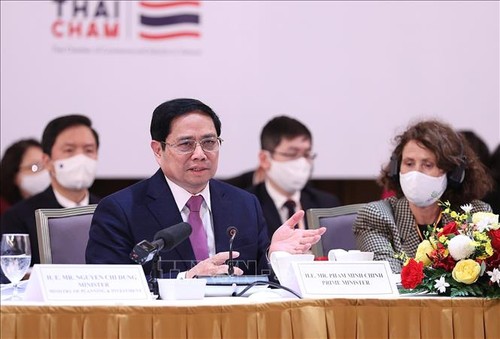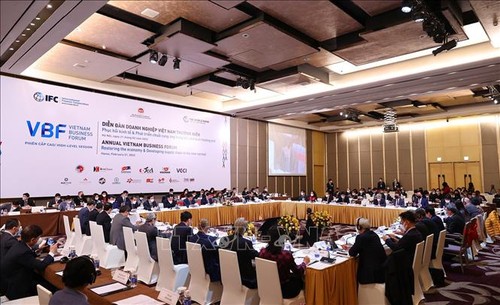 Prime Minister Pham Minh Chinh speaks at the Vietnam Business Forum. (photo: Duong Giang/ VNA) Prime Minister Pham Minh Chinh speaks at the Vietnam Business Forum. (photo: Duong Giang/ VNA) |
At the annual Vietnam Business Forum, themed “Restoring the economy and developing the supply chain in the new normal” in Hanoi on Monday, Prime Minister Pham Minh Chinh said Vietnam has implemented Doi moi or renewal, focusing on building a socialist democracy, a socialist state governed by law, of the people, by the people, and for the people, and a socialist-oriented market economy, with three main goals – removing bureaucratic subsidies, building a multi-sector economy, and global integration.
He said that after 35 years of Doi Moi, Vietnam has attained historic achievements. Never before has Vietnam had such stature, potential, position, and prestige in the international arena as it has today. Prime Minister Chinh said that by making people and businesses at the center, internal resources as a fundamental and long-term factor, and external resources as important breakthroughs, the Vietnamese Government continues to implement its 3 major strategies: fine tuning institutions, developing human resources, and building a modern coordinated infrastructure.
 The annual Vietnam Business Forum (Photo: Duong Giang/ VNA) The annual Vietnam Business Forum (Photo: Duong Giang/ VNA) |
The short-term task is to effectively implement the government’s socio-economic recovery and development program along with a flexible COVID-19 prevention and control and vaccination campaign. Vietnam will continue to work to keep the macro-economy stable, improve the business and investment environment, speed up digital transformation, boost the growth of a digital economy, digital society, green economy, and circular economy, and mitigating climate change, the Prime Minister said.
“The socio-economic recovery and development program should be implemented sustainably. We plan to spend 4% of GDP, focusing on key areas. The first is strengthening our medical capacity. The second is social security. We won’t sacrifice social security and equality for mere growth. The third is helping the less fortunate, including Vietnam’s most vulnerable groups. The fourth is helping businesses. In the past reducing taxes, fees, and electricity, water, and telecommunications bills brought positive results. We are recovering the labor market and developing the digital infrastructure for climate change response and transportation,” the PM said.
Prime Minister Chinh said Vietnam is creating a fair environment for economic sectors and encouraging private and foreign investment, investment in high-tech, the support industry, smart agriculture, environmental protection, renewable energy, and projects serving social security and green transformation.
Vietnam is focusing resources on recovering the supply chain, organizing efficient transportation of goods, stabilizing the fuel supply, ensuring safe production and trade in the new normal period, giving priority to pandemic control, simplifying administrative procedures, resolving obstacles in mechanisms and policies related to tariffs, credits, human resources, and logistics. It’s necessary to develop capital markets, land, resources, and science and technology to make Vietnam more competitive, effective, and resilient.
“One essential task right now is green transformation. Green transformation is a global trend, encompassing green economy and green energy. We are determined not to sacrifice the environment for mere economic growth. Digitalization rests on three pillars: digital infrastructure, digital administration, and digital citizens. Our climate change goals are to achieve net zero carbon emission by 2050 and reduce methane by 30%. We urge the international community to be fair and just in energy transformation,” said Mr. Chinh.
He confirmed that the government will take strong, creative, responsible, disciplined, and transparent actions. The government expects the business community to work with the government and people to overcome all difficulties and move forward.